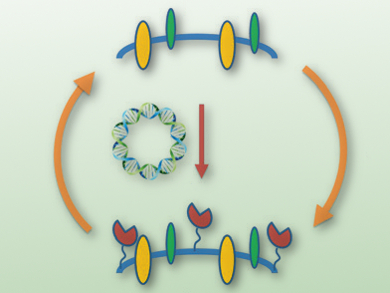Glypican 3 (GPC3) is a glycoprotein that is highly expressed on liver cancer cell surfaces, and is therefore often suggested to be a biomarker for both diagnostic and therapeutic (“theranostic”) clinical applications. DNA aptamers are a type of molecular probes, generated by in vitro selection, that can recognize specific cell-surface targets. They have great potential for clinical use.
Chen Liu, University of Florida, Gainesville, FL, USA, Steven A. Benner, Foundation for Applied Molecular Evolution, Firebird Biomolecular Sciences LLC, Alachua, FL, USA, Weihong Tan, University of Florida and Hunan University, Changsha, China, and colleagues applied laboratory in vitro evolution technology to generate six-nucleotide DNA aptamers that bind to a cell engineered to overexpress GPC3.
The potential binding affinity within a DNA library was enhanced by adding two nucleotides (Z and P) that form an unnatural Watson–Crick pair in addition to the two standard (A:T and G:C) Watson–Crick pairs. Of the eight six-nucleotide aptamers isolated, five were found to only bind to GPC3-overexpressed cells but not to GPC3-“negative” cells.
These results show for the first time the ability of six-nucleotide aptamers to selectively bind to cells that are engineered to overexpress a specific cell-surface protein. The aptamers can thus distinguish cells that display this protein from those that do not.
- Aptamers against Cells Overexpressing Glypican 3 from Expanded Genetic Systems Combined with Cell Engineering and Laboratory Evolution,
Liqin Zhang, Zunyi Yang, Thu Le Trinh, I-Ting Teng, Sai Wang, Kevin M. Bradley, Shuichi Hoshika, Qunfeng Wu, Sena Cansiz, Diane J. Rowold, Christopher McLendon, Myong-Sang Kim, Yuan Wu, Cheng Cui, Yuan Liu, Weijia Hou, Kimberly Stewart, Shuo Wan, Chen Liu, Steven A. Benner, Weihong Tan,
Angew. Chem. Int. Ed. 2016, 55, 12372–12375.
DOI: 10.1002/anie.201605058




